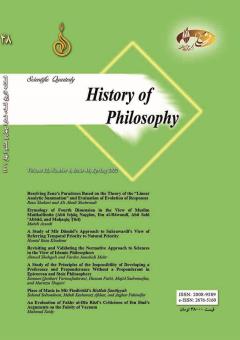A Study of the Principles of the Impossibility of Developing a Preference and Preponderance Without a Preponderant in Epicurean and Stoic Philosophers
Subject Areas : Geneology of philosophical schools and IdeasSamane Qanbari Varnusfaderani 1 * , Hassan Fathi 2 , Majid Sadremajles 3 , Morteza Shajari 4
1 - PhD candidate of Philosophy, University of Tabriz, Tabriz, Iran,
2 - Professor of Philosophy, University of Tabriz, Tabriz, Iran
3 - Assistant Professor, Philosophy Department, University of Tabriz, Tabriz, Iran
4 - Professor of Philosophy, University of Tabriz, Tabriz, Iran
Keywords: principle of the impossibility of developing a preference, principle of the impossibility of preponderance without a preponderant, principle of causality, fate, destiny, diversion of atoms, identity of indiscernibles,
Abstract :
The principles of the impossibility of preponderance without a preponderant and the impossibility of developing a preference are among the most important principles of Islamic philosophy that have been widely discussed. Since the related debates have provoked several contradictory ideas, their study aims to clarify many of the problems in Islamic philosophy. The purpose of this paper is to examine the principles of the impossibility of preponderance without a preponderant and developing a preference in Epicurean and Stoic philosophies. These two principles play extremely diverse functions in these two schools of philosophy and are utilized in ethical, epistemological, and physical discussions. Stoics have completely accepted the principle of the impossibility of developing a preference. They also agree with the principle of the impossibility of preponderance without a preponderant but believe that it is based on the principle of the impossibility of making a preference. Stoics maintain that preponderance without a preponderant leads to motion without a cause. Epicureans agree with the principle of the impossibility of developing a preference at a macroscopic scale or in the realm of bodies and events. However, they reject it in the microscopic realm of atoms at least in the case of their diversion. Epicureans accept the principle of the impossibility of preponderance without a preponderant and believe that it is generally possible. However, they acknowledge that it is discreditable in some cases and allowed in some others. They hold that preponderance without a preponderant is a supreme example of Man’s free will.
ابراهیمی دینانی، غلامحسین (۱۳۸۸) قواعدکلی در فلسفۀ اسلامی، تهران: پژوهشگاه علوم انسانی و مطالعات فرهنگی.
ابنسینا (۱۳۸۱) الاشارات و التنبیهات، قم: بوستان کتاب.
سهروردی، یحیی بن حبش (۱۳۷۲) مجموعه مصنفات شیخ اشراق، تهران: مؤسسة مطالعات و تحقیقات فرهنگی.
سهروردی، یحیی بن حبش (1383) حكمةالاشراق، ترجمه سيدجعفر سجادي، تهران: دانشگاه تهران.
عبودیت، عبدالرسول (۱۳۹۸) «اصل علیت»، معرفت فلسفی، دوره ۶۵، شمارة 1، ص۱۱-۲۶.
غزالی، محمد (۱۳۸۳) تهافت الفلاسفه، ترجمه حسن فتحی، تهران: ثارالله.
فارابی، ابونصر محمد (۱۳۸۱) فصوص الحکمة و شرحه، تهران: انجمن آثار و مفاخر فرهنگی.
ملاصدرا (1368) الحكمةالمتعالية فی الأسفار العقلية الأربعة، قم: مصطفوي.
Alexander, A. (1983). On fate. trans. by R. W. Sharples. London: Gerald Duckworth & Co. Ltd.
Baily, C. (1964). The Greek atomists and Epicurus. New York: Russel & Russel.
Bobzien, S. (1998). Determinism and freedom in Stoic philosophy. New York: Oxford University Press.
Empiricus, S. (1933). Sextus Empiricus. trans. by Rev. R. G. Bury, Litt.D., (4 volumes), London: Harvard University Press.
Epicurus, (1926). The Extant Remains, trans. by C. Baily, Oxford: Oxford University Press.
Furley, D. (1967). Two Studies in the Greek atomists. Princeton: Princeton University Press.
Graham, D. W. (2010). The texts of early Greek philosophy. vol. 1. Cambridge: Cambridge University Press.
Hankinson, R. J. (1997). Cause and explanation in ancient Greek thought. Austin: University of Texas.
Inwood, B. and Lloyd, P. Gerson. (2008). The Stoics reader: selected writings and Testimonia. Cambridge: Hackett Publishing Company.
Keynes, J. M. (1921). A treatise on probability. London: MacMillan.
Laetrius, D. (2015). The complete works of Diogenes Laetrius. United Kingdom: Delphi Publishing Ltd.
Luccretius, (1969). On the nature of things. trans. with introduction and notes by M. F. Smith. Indianapolis: Hackett Publishing Company.
O’Keefe, T. (2005). Epicurus on freedom. New York: Cambridge University Press.
Plotinus, (1967). Enead III, trans. by A. H. Armstrong, London: Harvard University Press.
Plotinus, (1990). Enead II, trans. by A. H. Armstrong, London: Harvard University Press.
Plotinus, (2013). The complete works of Plutarch. United Kingdom: Delphi Publishing Ltd.
Sambursky, S. (1959). Physics of the Stoics. London: Routledge & Kegan Paul Ltd.
Sandbach, F. H. (1989). On Stoics. London: Gerald Duckworth & Co. Ltd.
Wentworth, D. N. (1954). Epicurus and his philosophy. Minneapolice: University of Minnesota Press.

